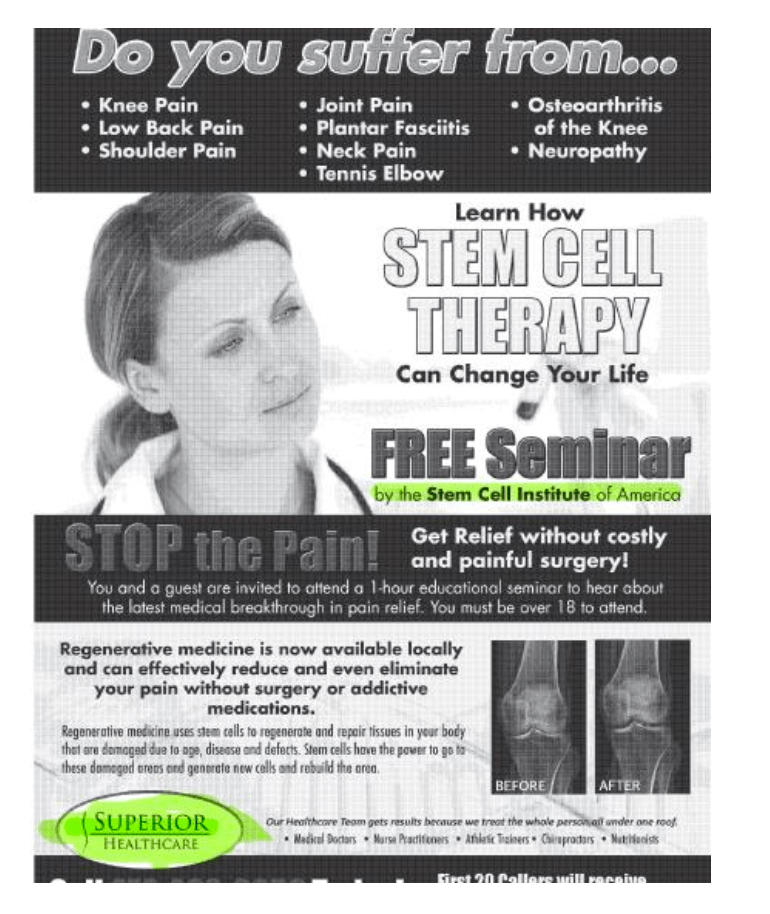An unproven Georgia stem cell clinic called Superior Healthcare and other co-defendants recently lost a key court case.
Some of you may remember that the Attorney General (AG) of Georgia Chris Carr and the FTC have been collaborating on this case. Now we have the good news that they have won the case via a favorable summary judgment ruling.
How large will the monetary penalties be?

Remarkably, the AG and FTC are asking for more than $17 million in penalties and restitution. Will the defendants also be subject to injunctions on future stem cell activities? We’ll find out more at the next hearing in mid-June.
It’s a striking story in part because it reflects a rare case where unproven stem cell clinics successfully have been held accountable in a big way. Most make millions off of consumers without consequences.
Superior Healthcare case
Where did this case come from?
Here’s the original announcement by the FTC on the case from a few years back, which has more information. The FTC and the Georgia AG made several allegations related to marketing unproven stem cells. There’s also some useful additional brief background from a news article:
“Attorney General Chris Carr and the Federal Trade Commission (FTC) filed a joint enforcement action against Superior Healthcare, LLC, Regenerative Medicine Institute of America, LLC d/b/a Stem Cell Institute of America, LLC, Physicians Business Solutions, LLC, Steven Peyroux, and Brent Detelich for allegedly violating the Georgia Fair Business Practices Act (FBPA) and the FTC Act by making false and misleading claims about the regenerative medicine products they offered to consumers in Georgia.”
Note that Superior Healthcare name, which I’ll come back to related to another Georgia case. It’s also striking how many businesses were named as defendants. Stem cell clinic firms run by some of the same people often have a constellation of businesses associated with them with various interconnections.
In the new summary judgment ruling the court said there were no disputes of fact here and granted the summary judgment motion of the FTC and Georgia AG. I’m not an attorney, but it sounds like full victory for Georgia and the FTC.
The defendants appear, according to the court document, to have been selling unproven stem cells from a variety of locations including chiropractic clinics. In the process, they made many health claims, and the scope of these businesses was huge.
Striking data from this court ruling
From 2017-2019, Superior Healthcare directly or via satellite locations had at least 485 customers leading to an overall cost of more than $3.3 million. That’s a lot of wasted money in my opinion.
The document also notes that the vast majority of customers were over age 60 and some of the damages sought relate to targeting older people. This fits with the broader trend of stem cell clinics targeting seniors.
The fact that both individual defendants Steven Peyroux and Brent Detelich are/were chiropractors also is consistent with the pattern in the last 6-8 years of chiros more often being involved in marketing of unproven stem cells.
Some of the details on the marketing and sales strategies here are troubling. There seem to have been some incorrect statements that the stem cell offerings were FDA or even FTC-approved. I wonder if the statements on the FTC are in part why that agency jumped in here.

$17 million in penalties and restitution sought from Superior Healthcare, et al.
The numbers of the possible monetary penalties are staggering here:
“In total, the State seeks $14,430,000 in civil penalties from all three remaining Defendants and $3,350,416 in restitution from Defendants Peyroux and Detelich. (MSJ, Doc. 73-1 at 33–34.)”
That’s more than $17 million in total. They may not get that amount, but even a fraction could be a relatively large financial hit for those involved. For comparison, NY AG Letitia James got a $5.1 million outcome from a Manhattan stem cell clinic.

Another Georgia “Superior Healthcare” case in 2023
Georgia has arguably been one of the busiest states taking on stem cell clinics. AG Carr won a related stem cell case last summer too. From coverage back then:
“A state lawsuit filed in September 2020 against a Sandy Springs-based stem cell clinic chain sought millions of dollars in penalties, accusing the company of reaping at least $6.4 million in gross sales by persuading elderly and disabled patients to pay for dubious pain cures…Georgia Attorney General Chris Carr’s office announced this week that Elite Integrated Medical, formerly Superior Healthcare Group, and owner/ manager Justin Paulk will pay $287,631 under a settlement agreement.”
Is there some deja vu on that firm name? Any connections between the defendants and/or firms in these two distinct Georgia cases? Anyone know?
In the older case the settlement was relatively low, which was disappointing.
Looking ahead: states & feds should work together more on stem cell cases
Numerous other state AGs even beyond Georgia and New York have also taken action and even won cases and large monetary judgments against unproven stem cell clinics. That’s all good.
However, we should keep in mind that there are many hundreds of other similar clinics across every state in the US impacting at least tens of thousands of people annually. Unfortunately, most of that activity is not being effectively addressed by any state or federal government authorities. State medical boards also appear to be doing almost nothing relative to the scope of the problem, which is a big disappointment. Many physicians are committing stem cell-related misconduct.
I wish the FTC would work with many other state AGs on similar cases. Maybe they are doing more and we just don’t know about it yet.
Is the FTC working with the FDA on some stem cell clinic cases? Given the massive scope of the unproven stem cell clinic industry in the US, a team effort of different state and federal agencies might be the only way to get things under control.
Related Posts
- SEO Powered Content & PR Distribution. Get Amplified Today.
- PlatoData.Network Vertical Generative Ai. Empower Yourself. Access Here.
- PlatoAiStream. Web3 Intelligence. Knowledge Amplified. Access Here.
- PlatoESG. Carbon, CleanTech, Energy, Environment, Solar, Waste Management. Access Here.
- PlatoHealth. Biotech and Clinical Trials Intelligence. Access Here.
- Source: https://ipscell.com/2024/03/georgia-ag-ftc-win-superior-healthcare-stem-cell-clinic-case-seek-17-million/
